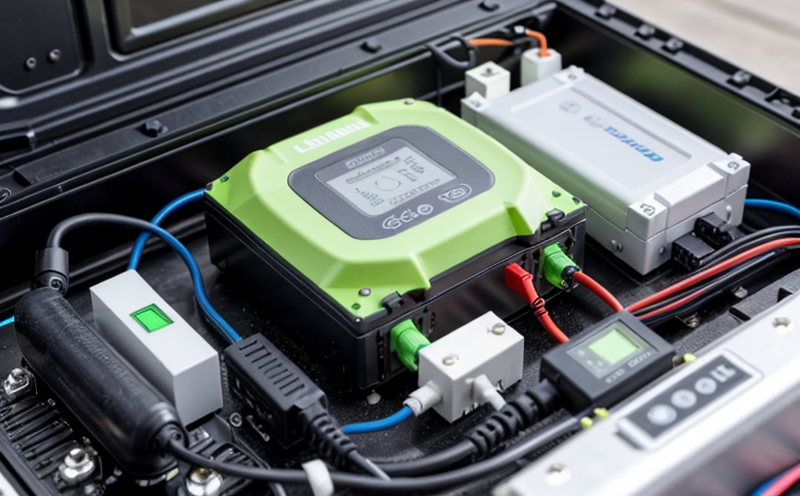GB/T 22084 Lithium-Ion Battery Testing for Alkaline Replacement Cells
The GB/T 22084 standard provides a comprehensive framework for testing lithium-ion (Li-ion) batteries designed to replace alkaline cells. This standard is particularly important in the context of portable electronics, medical devices, and energy storage systems where reliability and safety are paramount. Compliance with this standard ensures that Li-ion replacement cells meet stringent performance criteria, enhancing user confidence and ensuring compatibility across various applications.
The testing protocol outlined in GB/T 22084 is designed to evaluate the mechanical durability, electrical characteristics, and overall performance of Li-ion batteries. This includes assessing the battery’s ability to withstand thermal stresses, shock impacts, and cyclic charging/discharging without degradation. The standard also focuses on ensuring that these cells can be safely used in environments where alkaline batteries are typically employed.
The testing process begins with rigorous specimen preparation, which involves selecting representative samples of Li-ion batteries. These specimens undergo a series of tests to evaluate their performance under various stress conditions. Key parameters include internal resistance measurement, cycle life evaluation, and capacity retention assessment. The standard also mandates that the cells be tested for safety features such as overcharge protection and short-circuit currents.
In terms of instrumentation, specialized equipment is used to simulate real-world usage scenarios. For example, cyclic stress tests are conducted using programmable battery testers capable of simulating thousands of charge/discharge cycles. Temperature cycling devices ensure that the batteries can withstand extreme temperature changes without failure. Additionally, mechanical shock and vibration testing is performed to assess the resilience of the cells against physical abuse.
The acceptance criteria for GB/T 22084 are stringent, ensuring that only high-quality Li-ion replacement cells meet the necessary standards. The standard specifies minimum performance thresholds for each test parameter, and batteries failing to meet these criteria must be rejected. This ensures that consumers purchasing alkaline replacement cells can expect consistent quality and reliability.
Compliance with GB/T 22084 is particularly significant in markets where environmental regulations are stringent, as it helps manufacturers demonstrate their commitment to sustainability. By using Li-ion batteries instead of traditional alkaline cells, companies can reduce waste and promote the use of more environmentally friendly alternatives. This standard also facilitates easier recycling processes by ensuring that the materials used in these batteries are compatible with existing recycling infrastructures.
Furthermore, adherence to GB/T 22084 offers a competitive advantage by allowing manufacturers to enter new markets or expand their reach into regions where this standard is mandatory. It enhances brand reputation and builds trust among consumers who prioritize safety and environmental responsibility in their product choices.
Why It Matters
The importance of GB/T 22084 Lithium-Ion Battery Testing for Alkaline Replacement Cells cannot be overstated. This testing ensures that the Li-ion batteries used as replacements for alkaline cells meet rigorous performance and safety standards, which are critical in various applications ranging from consumer electronics to medical devices.
Firstly, compliance with this standard is essential for manufacturers aiming to enter or expand their market presence in regions where GB/T 22084 is mandatory. This includes ensuring that the batteries can withstand rigorous environmental and operational stress conditions without compromising performance or safety.
Secondly, it enhances consumer confidence by providing assurance of consistent quality and reliability. In markets with strict regulations regarding battery safety and performance, this standard helps build trust between manufacturers and consumers.
Lastly, adherence to GB/T 22084 facilitates easier integration into existing recycling processes, promoting sustainability efforts in the industry. By ensuring that Li-ion batteries are compatible with current recycling technologies, manufacturers can contribute positively to environmental conservation goals.
Why Choose This Test
- Rigorous Performance Evaluation: GB/T 22084 ensures that Li-ion replacement cells meet stringent performance criteria across multiple parameters including internal resistance, cycle life, and capacity retention.
- Safety Assurance: The standard mandates tests for overcharge protection and short-circuit currents, ensuring the safety of users and devices.
- Compatibility with Regulations: Compliance with this standard helps manufacturers meet regulatory requirements in various regions, expanding market opportunities.
- Sustainability Focus: By promoting high-quality Li-ion batteries, the standard supports sustainability efforts through easier recycling processes.





